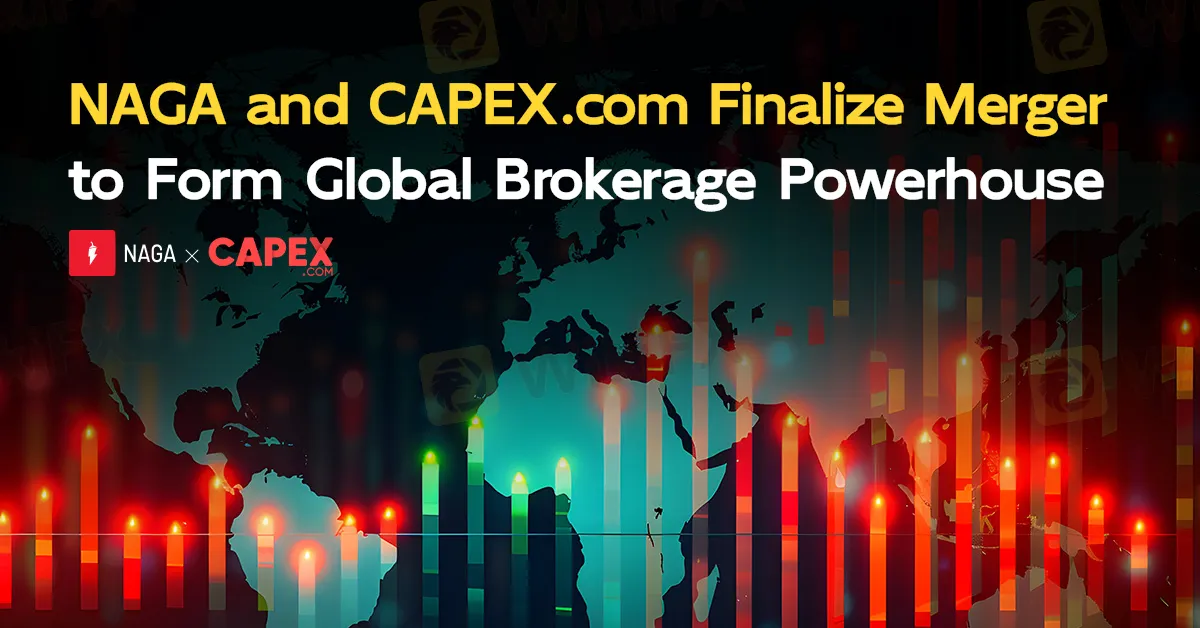简体中文
繁體中文
English
Pусский
日本語
ภาษาไทย
Tiếng Việt
Bahasa Indonesia
Español
हिन्दी
Filippiiniläinen
Français
Deutsch
Português
Türkçe
한국어
العربية
NAGA and CAPEX.com Finalize Merger to Form Global Brokerage Powerhouse
abstrak:NAGA Group, a German brokerage firm, has officially completed its merger with Key Way Group Ltd., the operator behind the CAPEX.com brand. The merger will create one of the leading neo-brokers in the world, boasting around 1.5 million users across more than 100 countries.

NAGA Group, a German brokerage firm, has officially completed its merger with Key Way Group Ltd., the operator behind the CAPEX.com brand. This strategic move follows a decisive vote by NAGA shareholders in April 2024, where an overwhelming 99.81% approved the merger. The deal, subject to regulatory clearance, was finalized by the end of August 2024, marking a significant milestone in the global brokerage industry.
The merger will create one of the leading neo-brokers in the world, boasting around 1.5 million users across more than 100 countries. As part of the integration, users from CAPEX.com, Key Way Groups trading platform, will soon be migrated to the NAGA ecosystem. This merger is expected to not only expand NAGA's user base but also enhance the company's operational efficiency and profitability.
NAGA anticipates annual savings of up to EUR 9 million, thanks to operational synergies, user migration, and licensing efficiencies. Furthermore, the company projects an additional EUR 4 million boost to its EBITDA annually, owing to the adoption of common technology across the group. These savings are expected to extend into other areas, including regulatory, personnel, trading, and customer acquisition costs.

In terms of product offerings, the integration of CAPEX.com into NAGA is also expected to enhance the lifetime value of CAPEX.coms users. By introducing features like social trading, neo-banking, and cryptocurrency trading, NAGA aims to broaden its product range and attract a wider demographic of investors.
Octavian Patrascu, CEO of The NAGA Group, expressed excitement about the merger, stating that the successful completion sets the stage for the company to focus on synergies and drive further growth. Patrascu emphasized the importance of maintaining NAGAs innovative startup mentality while leveraging the benefits of a larger and more structured organization. He also highlighted the energy and alignment within the NAGA team as they embark on this new chapter of expansion and innovation.
In line with the merger, NAGA has made key changes to its leadership team to support global growth. Michael Milonas has been appointed as the Group CEO, while Sam Chaney takes on the role of Chief Commercial Officer (CCO) to drive growth, particularly in emerging markets.
Financially, NAGA's brokerage business saw a revenue decline in 2023, with earnings reported at €45.5 million, down 20% from the previous year‘s €57.6 million. However, the company’s EBITDA showed a substantial improvement, rising to approximately €7 million from a loss of €-13.7 million in the previous year.
Despite reducing its marketing and sales spending, NAGA managed to optimize its user acquisition strategy. The company cut its marketing expenses from €26 million in the first nine months of 2022 to just €4 million for the same period in 2023. This shift resulted in a significant reduction in the average net acquisition cost per new account, which dropped from €1,269 in 2022 to €181 in 2023. Despite this decrease, NAGA still managed to acquire around 10,000 new funded accounts in the first three quarters of 2023, a modest 19% decline compared to the previous year.
With the merger now complete, NAGA is poised to strengthen its position in the competitive global brokerage market and deliver enhanced value to its expanding user base.

Disclaimer:
Ang mga pananaw sa artikulong ito ay kumakatawan lamang sa mga personal na pananaw ng may-akda at hindi bumubuo ng payo sa pamumuhunan para sa platform na ito. Ang platform na ito ay hindi ginagarantiyahan ang kawastuhan, pagkakumpleto at pagiging maagap na impormasyon ng artikulo, o mananagot din para sa anumang pagkawala na sanhi ng paggamit o pag-asa ng impormasyon ng artikulo.
Broker ng WikiFX
Exchange Rate



